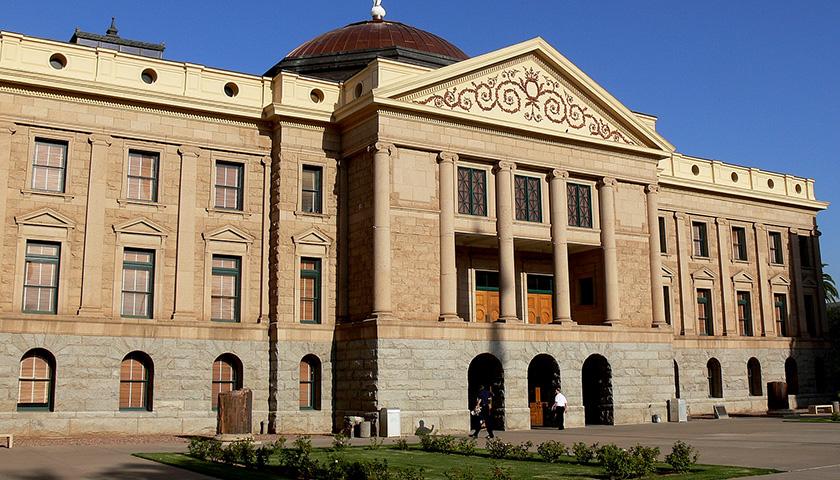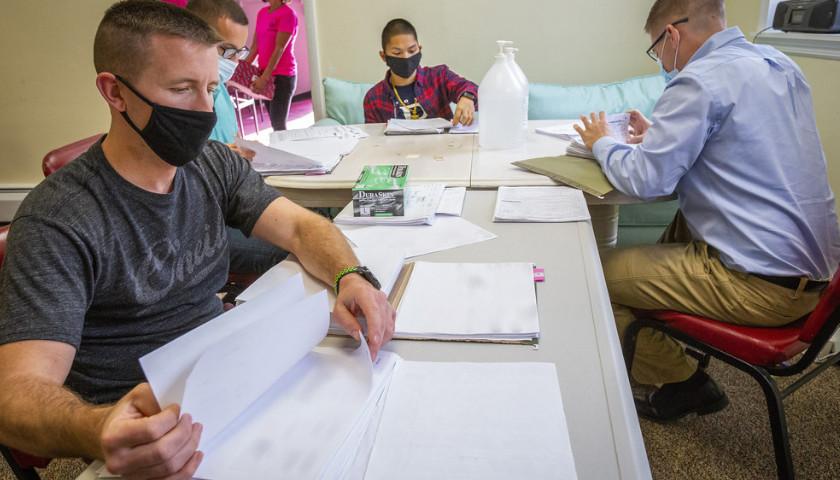A trial court judge ordered Maricopa County Recorder Stephen Richer earlier this month to pay grassroots activist Merissa Hamilton $25,345.50 for the costs of over 100,000 documents she produced in response to a subpoena from him.
Richer sued Republican Arizona Senate candidate Kari Lake for defamation last year over remarks she made accusing him of intentionally inserting 300,000 ballots into the 2022 election. As part of the lawsuit, he subpoenaed documents from Hamilton and others. The ballots in question lacked a chain of custody, which is a class 2 misdemeanor.
Richer (pictured above), who started a PAC for Republicans who believe there was no election fraud in 2020, initially refused to pay Hamilton for the documents, claiming that he preferred them in “native form,” which means electronic files if that is how they were first created. He said Hamilton’s “unilateral decision” was to produce them on paper. Hamilton showed up at his office with a truck containing the documents and refused to accept them.
However, about 90 percent of the documents were in paper form when Hamilton first obtained them since they were records from a subpoena former Arizona State Senator Kelly Townsend served on Maricopa County regarding the botched 2020 election.
Maricopa County Superior Court Judge Randall Warner said Hamilton “misread” the instructions, which he said was understandable since she was a “non-lawyer endeavoring to comply with Plaintiff’s subpoena. … The present dispute therefore resulted from a miscommunication, and as between the two, the financial burden of that miscommunication should fall on the party who wrote the instructions, and who wants the documents.”
Warner cited the language on the cover sheet accompanying the subpoena. He said, “That letter said Plaintiff was seeking ‘copies of all documents requested,’ that she could comply with it by ‘mailing or delivering the requested documents,’ and that she would be reimbursed for ‘reasonable copying expenses.’”
Hamilton, who represented herself, asked for $32,345.50, but Warner said she was not entitled to the additional $7,000 for “clerical costs” since “those costs are not itemized as required by A.R.S. § 12-351(A), and because 280 hours — the equivalent of seven people working full-time for a week — is an unreasonable amount of time to spend on producing documents.” He awarded her 25 cents per page and said she must also turn over the documents electronically.
Section (A) of section of A.R.S. 12-351 provides, “All reasonable costs incurred in a civil action by a witness who is not a party to the action with respect to the production of documents pursuant to a subpoena for the production of documentary evidence shall be charged against the party requesting the subpoena if the witness submits an itemized statement to the requesting party stating the reproduction and clerical costs incurred by the witness.”
Richer gave Hamilton a check from his attorney, Dan Maynard of Maynard Cronin, Erickson, Curran & Reiter. This could violate Arizona’s gift clauses. The state’s gift clause statutes prohibit public officials from receiving “gifts” unless properly disclosed as a campaign contribution or under an exception. A.R.S. 38-505(A) states, “No public officer or employee may receive or agree to receive directly or indirectly compensation other than as provided by law for any service rendered or to be rendered by him personally in any case, proceeding, application, or other matter which is pending before the public agency of which he is a public officer or employee.”
One of the exceptions to the gift clause is a quid pro quo. A.R.S. 41-1231(9)(j) allows: “An item that is given to a state officer or employee if the state officer or employee gives an item of approximately the same value to the giver of the item at the same time that the item is given or on a similar occasion as the one that prompted the original item to be given.”
Richer’s subpoena asked Hamilton for all documents she had related to the 2022 election, which was a considerable amount since Hamilton is the custodian of many public records due to her election work. He specifically asked for all documents related to “election interfering,” “ballot sabotage,” and printer size.
The subpoena said it was related to a speech she gave about the pro-Lake organization Save Arizona and demanded records related to Save Arizona. Hamilton declined to turn them over since she is not in charge of Save Arizona and is not in control of those documents.
Richer wanted documents about any time she mentioned him in a speech or other communications, including text messages. He asked her for documents related to any threats or antisemitism directed at him.
Since the judge’s order was issued, Richer has not taken custody of the documents and is still attempting to get them electronically.
Lake agreed in April not to fight the lawsuit, citing the enormous cost it would take for a full trial. The litigation is in the discovery phase, with recent motions filed regarding interrogatories served on Lake. A pretrial conference is set for February, and a trial to determine damages is expected sometime next year. Arizona State University’s Sandra Day O’Connor College of Law First Amendment Clinic co-authored a motion to dismiss with Lake’s counsel early on in the case, requesting dismissal of the lawsuit for infringing on the First Amendment.
– – –
Rachel Alexander is a reporter at the Arizona Sun Times and The Star News Network. Follow Rachel on X/Twitter. Email tips to [email protected].
Photo “Stephen Richer” by Stephen Richer.





